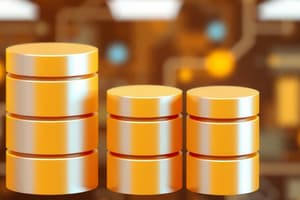Podcast
Questions and Answers
What is data?
What is data?
- Processed and presented information suitable for human interpretation
- Class list of students
- Collection of facts and figures, such as numbers, words, measurements, observations or descriptions (correct)
- Raw data that hardly makes any sense
What is information?
What is information?
- Collection of facts and figures, such as numbers, words, measurements, observations or descriptions
- Raw data that hardly makes any sense
- Processed and presented data suitable for human interpretation (correct)
- Class list of students
What is a database?
What is a database?
- Processed and presented information suitable for human interpretation
- Raw data that hardly makes any sense
- A structured collection of data (correct)
- Class list of students
What is the purpose of a Database Management System (DBMS)?
What is the purpose of a Database Management System (DBMS)?
What is MySQL?
What is MySQL?
Flashcards are hidden until you start studying
Study Notes
Data, Information, and Database Fundamentals
- Data: Raw, unorganized facts and figures, often in the form of numbers, words, or images, which are processed, stored, and transmitted by computers.
- Information: Organized, structured, and meaningful data that provides value, answers a question, or solves a problem.
- Database: A collection of related data that is organized, stored, and retrieved efficiently, typically in a digital format.
Database Management Systems (DBMS)
- A DBMS is a software system that enables the creation, maintenance, and manipulation of databases.
- The primary purpose of a DBMS is to provide a way to store, retrieve, and manage data in a controlled and efficient manner.
- A DBMS provides a layer of abstraction between the user and the physical storage, making it easier to interact with the database.
MySQL
- MySQL is an open-source Relational Database Management System (RDBMS) that uses Structured Query Language (SQL).
- MySQL is a popular DBMS used for web applications, especially with PHP, to store and retrieve data efficiently.
- MySQL supports standard SQL features and is known for its high performance, scalability, and reliability.
Studying That Suits You
Use AI to generate personalized quizzes and flashcards to suit your learning preferences.




